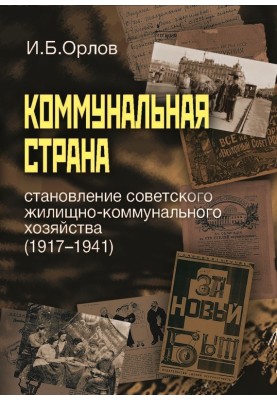Communal country: the formation of the Soviet housing and communal services (1917–1941)
 Instant download
Instant download
after payment (24/7)
 Wide range of formats
Wide range of formats
(for all gadgets)
 Full book
Full book
(including for Apple and Android)
In the book, Doctor of Historical Sciences, Professor of the National Research University Higher School of Economics, I.B. Orlov reconstructs the process of formation and development of the Soviet public utilities between the two world wars. For the first time, based on archival documents, periodical press materials, personal sources (diaries, memoirs, letters to government institutions) and photographic documents, it is shown how the idea of a communal hostel was implemented in practice. The formation of housing and communal services as a national system is revealed in the context of the implementation of several models of social development: war communism, NEP and Stalinist modernization. The book continues the historiographical tradition of recent years, which is characterized by an appeal to everyday stories and everyday practices of ordinary people. As a result, the history of Soviet housing and communal services appears from two sides: as a set of institutions and the relationship with them of various layers of the urban population. For a wide range of representatives of social and humanitarian knowledge, as well as everyone interested in Soviet history.
Data sheet
- Name of the Author
- Игорь Орлов Борисович
- Language
- Russian
Reviews
Важливий внесок у вивчення радянської історії
Книга І.Б. Орлова "Комунальна країна: становлення радянського житлово-комунального господарства (1917–1941)" є справжнім відкриттям для тих, хто цікавиться історією радянського періоду. Автор майстерно реконструює процес формування комунального господарства, використовуючи безліч архівних документів та особистих свідчень, що надає книзі велику цінність. Читач отримує можливість заглибитися в побутові аспекти життя радянських людей, зрозуміти, як ідеї комуналізації реалізовувалися на практиці, а також які виклики стояли перед населенням у цей складний період. Книга не лише розкриває історію інститутів, але й показує, як різні верстви населення взаємодіяли з ними, що робить її надзвичайно актуальною для дослідження соціальних процесів. Рекомендую цю книгу всім, хто хоче глибше зрозуміти радянську історію та її вплив на повсякденне життя людей.















